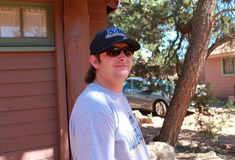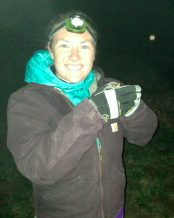Former Lab members
Julie Wachara, MS (Masters Student 2016-2018)
|
Julie graduated with her masters degree from the Nieto lab in 2018. She studies the genetic diversity of Borrelia burgdorferi in Western United States through citizen science. Outside the lab, Julie co-founded the NAU Heshima Bioethics Society, an organization that focuses on the investigation and discussion of bioethical topics in healthcare and law in order to develop ethical reflection and decision making in future healthcare providers. She currently serves as a mentor and advisor to NAUHBS and coaches the NAU Heshima bioethics debate team. Julie is currently working at a biomedical company and plans to continue her education studying virology as a PhD student after she completes her masters.
|
Eric Green, MS (Masters Student 2016-2018)
|
email:
|
Eric Green is a wildlife ecologist with primary research interests in mammalian behavioral ecology. He earned a B.S. in Wildlife Biology from Missouri State University, where he studied seasonal circadian rhythm shifts in nine-banded armadillos, and contributed to several other students’ projects involving bats, turtles, and salamanders. Eric earned his M.S. in Biology in the Nieto Lab at Northern Arizona University. There, he explored the relationship between Rickettsia spp. bacteria and coyotes in Arizona. In the fall of 2018, Eric moved to Saskatchewan, Canada to begin a Ph.D. program at the University of Regina. His doctoral research will focus on bats. He will undertake several ecological questions related to hoary bats (Lasiurus cinereus), a species facing apparent population declines due to wind turbine strikes.
|
Alma Solis, MS (Masters Student 2015-2017)
|
email:
|
Alma joined the Nieto Lab as a summer NSF Research Experience Undergraduate student. She investigated Rocky Mountain Spotted Fever, a tick-borne disease transmitted by the brown dog tick. She continued her undergraduate research working with Dr. Nieto as an NSF Undergraduate Research Mentorship Fellow and ultimately matriculated as a master’s students continuing her research on RMSF. She used phylogenetics to determine the brown dog tick diversity. After earning her M.S., she joined the Immunity, Inflammation, and Disease Laboratory (IIDL) at the National Institute of Environmental Health Sciences as an IRTA Post-baccalaureate Fellow. She studies the relationship between the lung microbiome and innate immune cell signaling in pulmonary diseases using in vivo models. She hopes to matriculate into a PhD program in Fall of 2019 to further pursue her research focused on vector-borne diseases and host-pathogen interactions.
|
Rhea Paige Zagar, MS (Masters Student 2015-2017)
Kylie Sage, MS (Masters Student 2014-2016)
|
email:
website: http://kyliesage-blogR.netlify.com |
Kylie's research in the Nieto Lab focused on the eco-epidemiology of tick-borne and zoonotic diseases, specifically tick-borne relapsing fever (TBRF). Using statistical models, she aimed to better understand the current distribution of the TBRF vector (Ornithodoros hermsi) and how suitable habitat will change over time with the effects of projected climate change. Ultimately, these projections provide insights into what populations will be most at-risk and highlight where preventive and control measures should be targeted. Currently, Kylie works as a biostatistician and R programmer at Oregon Health and Science University (OHSU) where her main focus is predictive risk modeling and biomarker discovery using microarray/qPCR data.
|
Adam Pilkington, MS (Masters student 2013-2015)
Stephanie Cinkovich, MS, PhD (Masters student 2012-2014)
|
Stephanie is interested in the sharing of tick-borne pathogens between wildlife and ticks in Arizona. This will include obtaining samples from bats, rodents, and ticks that inhabit canopies, caves and human built structures to evaluate the potential interactions between species that contribute to Borrelia spp. diversity in Northern Arizona. Stephanie is now working on a PhD at the University of Florida.
|
Carter "Reed" Hranac, MS (Masters Student 2012-2015)
|
email:
|
Reed is a disease ecologist with research centered on zoonotic viruses, sylvatic maintenance, and seasonality of disease. He earned a B.S. in Microbiology and a M.S. in Biology from Northern Arizona University. His master’s research in the Neito lab focused on the sylvatic distribution of Hantaviruses in the south-western U.S. He is currently a PhD candidate at Massey University in New Zealand where his work focuses on modelling diseases in wild bat populations.
|










